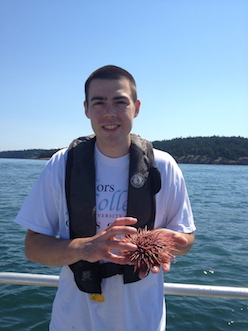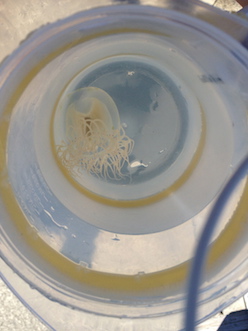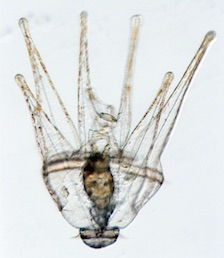Sea Grant Alumni Q & A: Tyler Carrier
by Chase Brunton
 Tyler Carrier was one of ten students in the state to receive the Maine Sea Grant Undergraduate Scholarship in 2014, and he also was awarded Sea Grant Program Development funds. His undergraduate honors thesis explored the interactions of sea urchin larvae and toxic algae in the Gulf of Maine, and was published in the journal Biological Bulletin. Carrier was born in Providence, Rhode Island, and grew up in Barre, Vermont. We caught up with him at the University of North Carolina at Charlotte, where he is now a graduate research assistant in the laboratory of Dr. Adam Reitzel.
Tyler Carrier was one of ten students in the state to receive the Maine Sea Grant Undergraduate Scholarship in 2014, and he also was awarded Sea Grant Program Development funds. His undergraduate honors thesis explored the interactions of sea urchin larvae and toxic algae in the Gulf of Maine, and was published in the journal Biological Bulletin. Carrier was born in Providence, Rhode Island, and grew up in Barre, Vermont. We caught up with him at the University of North Carolina at Charlotte, where he is now a graduate research assistant in the laboratory of Dr. Adam Reitzel.
Why did you choose UMaine for your undergraduate studies?
I knew— or at least I thought— that I wanted to study the ocean, so I initially applied to UMass Dartmouth, URI, UNE, and UMaine. When I visited UMaine, I met Wge [William G. Ellis, Associate Professor of Oceanography and Associate Director at the School of Marine Sciences], who told me about the numerous options I could have there. I could shape my career. I also felt comfortable at UMaine. Also, I was accepted into the Honors College at UMaine.
Looking back, do you think you made the right decision?
Without a doubt! The University of Maine, its faculty and staff, and vigorous marine sciences program gave me a disciplined freedom to explore— intellectually and physically— the marine realm, what it has to offer, and where my niche may be.
When (and why) did you decide you wanted to study invertebrates?
Subliminally? Always. Actively? Mid-way through freshman year of college. I find life much cooler to study when it’s distant from our own. We’re boring. So many other creatures use funky approaches to reproduction and survival, and have for many, many years. I found many of those to be invertebrates. But, it was Dr. Malcolm Shick’s class my first year when I was truly exposed to the diversity of invertebrates. I’ve been hitched ever since. Since then, I’ve focused my energy on the embryos and larvae of these invertebrates. I’m still starstruck that animals smaller than one millimeter can transport throughout the world oceans and survive—against all odds!
Indeed, it’s very cool stuff! Speaking of invertebrates, you recently had your work on sea urchin larvae published in Biological Bulletin. In that paper you looked at sea urchin larvae responses to starvation. Why did you choose to write about this topic?
 Many marine invertebrate larvae rely on finding their own food, what we call phytoplankton. The issue with this is that phytoplankton aren’t everywhere in the sea, so larvae have evolved ways to cope with not having food…. Understanding how larvae survive during extensive periods of transport in the sea. Understanding starvation biology is important because many, many animals rely on eating; not all can make their own food. The question comes as to why some animals are not phased by starvation, while others— like us, for example—are. World hunger is one of the biggest socioeconomic issues. What if we could take lessons from other animals— like urchin larvae—that have found alternatives to consistently relying on food? And, from these insights, could we design therapeutic treatments for people unable to consume proper daily nutrients for body maintenance and reproduction?
Many marine invertebrate larvae rely on finding their own food, what we call phytoplankton. The issue with this is that phytoplankton aren’t everywhere in the sea, so larvae have evolved ways to cope with not having food…. Understanding how larvae survive during extensive periods of transport in the sea. Understanding starvation biology is important because many, many animals rely on eating; not all can make their own food. The question comes as to why some animals are not phased by starvation, while others— like us, for example—are. World hunger is one of the biggest socioeconomic issues. What if we could take lessons from other animals— like urchin larvae—that have found alternatives to consistently relying on food? And, from these insights, could we design therapeutic treatments for people unable to consume proper daily nutrients for body maintenance and reproduction?
Can you talk about the results of the study?
From these experiments, we showed that urchin larvae that are starved decrease metabolism and developmental processes while increasing their immune system and sensitivity to the environment, and that they express genes involved in aging and longevity in other animals, such as humans.
How does it feel to have your work published?
Honestly, I don’t think about it. But when I do, I get a feeling of satisfaction because I was part of a collaborative effort towards advancing our understanding of the biosphere. I helped advance the frontier of knowledge…how cool is that?
You collaborated with two scientists at MDI Biological Laboratory for that paper. Can you talk a bit about your experience working and collaborating during the project?
It was really fun! James Coffman and Benjamin King (my collaborators) were interested in the mechanisms of development in larvae, and how genes control various developmental processes. I viewed the same mechanisms and processes from an ecological perspective with a dash of oceanography. I was the summer student whose job it was to figure out what was going on inside the larvae, specifically what pathways (like metabolism, for example) were being differently expressed between well-fed and starved larvae. We had no idea what was going to come from the work, as it was purely exploratory— although because of the different morphologies in well-fed vs. starved larvae, we suspected that some genes and their corresponding pathways might be expressed differently. To validate the results I ran another, similarly designed experiment where I looked at the expression of genes of that corresponded with the important pathways. The results were consistent— so that was cool.
Having taken the lead on the project (it was my summer project and Coffman’s research direction changed a bit), I began writing the manuscript (with a good deal of help form Coffman because it was my first go-around, and he’s a much, much better writer than myself). Writing the paper was just as much of a learning experience as the experimentation. I was able to see first hand how the peer-review process works: what reviewers say, how you deal with their requests, and so forth.
In 2014, you applied for and received the Sea Grant scholarship to support your undergraduate research. How has the Sea Grant scholarship impacted your education, work or career?
What was nice about [the Sea Grant scholarship] was that it supports a person, not specifically a project. So, those who were awarded the scholarship could spend the funds on their education or research. Because I was an out-of-state student and had separate funds through the Sea Grant Program Development Funds, I directed the scholarship to pay for my tuition. Also, what was really neat about the scholarship program was that you got to meet marine-related peers— we formed a network that can hopefully continue as our careers progress.
What advice would you give to marine science students, or students thinking about entering a marine science field?
Always challenge yourself, take risks, and be willing to try something new. Next, find your niche. No matter how long it takes, it’s there.
 To future marine scholars, I’d like to say that studying the ocean is much different than popular media presents its to be. There is unquantifiably more in the ocean than whales, dolphins, and sea turtles. If those are your reasons for entering marine science, keep it as an interest and embrace the reality that (in marine science) your energies, for the entirety of your career, are far more likely to be channeled to an alternate sub-field of marine science, such as oceanography (physical, chemical, or biological), ecology, biogeochemistry, aquaculture, toxicology, deep-sea, evolution, development, genetics, marine policy, etc. Don’t enter with narrow horizons; be willing to take an opportunity to try something new— you never know what the door will lead to. Some of the most beneficial experiences I’ve had come from taking on opportunities I was unsure about.
To future marine scholars, I’d like to say that studying the ocean is much different than popular media presents its to be. There is unquantifiably more in the ocean than whales, dolphins, and sea turtles. If those are your reasons for entering marine science, keep it as an interest and embrace the reality that (in marine science) your energies, for the entirety of your career, are far more likely to be channeled to an alternate sub-field of marine science, such as oceanography (physical, chemical, or biological), ecology, biogeochemistry, aquaculture, toxicology, deep-sea, evolution, development, genetics, marine policy, etc. Don’t enter with narrow horizons; be willing to take an opportunity to try something new— you never know what the door will lead to. Some of the most beneficial experiences I’ve had come from taking on opportunities I was unsure about.
When you’re not traveling or working in the lab, what do you like to do for fun?
I’ve always been a basketball player, so I enjoy dipping out from lab when I can and shooting hoops. I’ve always been into long distance running, so I try to run about 5 miles 2-3 times a week (although it doesn’t always happen…). I enjoy throwing a frisbee, attending various sporting events, hiking (when I can), squash (a more intense version of raquetball), and biking.
What do you like to read?
I’m a really boring reader… I read a lot of odd popular science, like recent discoveries in any form of science. I really enjoy books by Neil Degrasse Tyson— he’s my hero! I’m currently reading a book about the origin of the longitude and latitude system, which we take for granted… super cool stuff.
Where do you hope to be in the next ten years?
I hope to be starting my own independent laboratory focused on marine invertebrate larvae, their ecology, evolution, and relation to oceanography and symbiosis. At this time, I hope my science not just makes people smirk, giggle, or say, ‘this is cool…’ but makes them think… really think.
###
Interview conducted by Chase Brunton, a science communications assistant at Maine Sea Grant, October 2015.
Learn more about Maine Sea Grant scholarship opportunities for students.
To learn more about Carrier’s work, visit http://carrierlab.webs.com.
